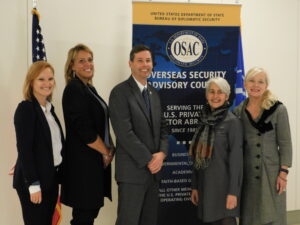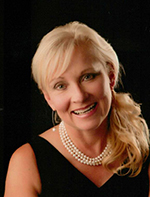5 Questions for Sandy Cowie, OSAC Private-Sector Chair
Sandy Cowie, Director of Global Security for Principal Financial Group, began her security management career in 1993 and joined the OSAC Council in 2010. ISF asked Sandy to reflect on her experience and tenure as she steps down as OSAC Private-Sector Chair.
As outgoing Private-Sector Chair, what do you feel are OSAC’s successes?
Sandy: The sustainability of the partnership for nearly 35 years. OSAC continues to be recognized as the premier and most successful public/private partnership model since 1985. This doesn’t happen by accident but through thoughtful and strategic leadership over the years.
I am very impressed with OSAC’s recent efforts on an enhanced holistic strategic focus and a willingness for both sectors to think outside the box and make sure we are viable going forward. There’s an openness in asking the hard questions and challenging status quo, while remaining true to OSAC’s mission. The ISF has been critical for OSAC to think strategically, increase engagement and communication across OSAC and ensure that all of the different OSAC groups [Country Councils, Regional Councils and Sector-specific Working Groups] share the same vision.

Sandy Cowie (far right) at the first Women in Security OSAC event in November 2017.
What are OSAC’s challenges?
Continuing viability and evolution of OSAC is critical. We need to leverage innovation, data, talent, and emerging services to complement our work, while keeping core to our mission and remaining contemporary. Sometimes we can get stuck in the status quo, but there is a clear opportunity to capitalize on synergies and strategy with all factions of OSAC – the Council, staff, working groups and Country and Regional Councils – to be more productive and share work in a coordinated, effective strategy.
You’ve been a champion of OSAC’s new Women in Security initiative. Did you face any challenges or obstacles as a woman when you began your career in global security?
I get asked this question a lot. Each of us faces our own unique challenges and obstacles in the course of our careers. Some are more visibly recognizable and others, perhaps not as much. I don’t think I am the exception to that. My goal has always been to be the best I can be and hopefully be at the table for what I bring to the table, not because of my gender, race, religious and/or political beliefs. To me, this is what true diversity is all about.
Certainly we continue to be a male-dominated industry, but I’ve seen a lot of progress over the years to move away from that stereotype. Early in my career, I would go to events and people would think that I was someone’s spouse and not a director of security. What helped me was breaking down barriers peer-to-peer.
There are always opportunities, but I am proud of the progress OSAC has consciously made in diversity overall. I am also proud to have been a part of seeing the Women in Security initiative move forward. They are doing some terrific work.
At a Women in Security event recently, a female colleague mentioned to me how surprised she was to see so many men in attendance. I responded that when you see men [at the event], that’s true progress. I am where I am because of male champions not going to gender stereotypes. OSAC’s approach with its Women in Security program is to welcome women and men.
How has ISF’s support enabled OSAC to tackle new initiatives?
The ISF has been incredibly impactful and a real enabler for OSAC’s mission at all levels. From standing up Regional Councils and supporting Country Councils to sponsoring OSAC’s topical educational forums and assisting with more effective and efficient processes all the way, the ISF is moving our strategy forward. The creation of the ISF has been a true turning point for OSAC.
What would be your vision for OSAC five years from now?
My vision is a sustained path and viability evolving for OSAC to continue to be the most successful public/private partnership in the world. It can be a big difference maker and a real trusted advisor in U.S. relations with other countries. I believe when OSAC was first established [in 1985] it was with a clear understanding of the broader underlying impact we can have, not only in the ability for U.S. companies to operate safely outside the U.S., but for the impact that can have to our overall relationship with those countries.
When U.S. companies can successfully and safely do business abroad, people get to work alongside each other, get to know and form relationships with people from outside the U.S.. Perhaps, the company provides enhanced opportunities for its employees and their families to form alliances [with non-U.S. colleagues], giving insight and respect to each other’s cultures. Leveraging our collective perspectives and efforts, I’m excited and proud of the impact we can have. It’s a big deal for the U.S. economy, the economies of other countries and our overall relationships with other countries.
About Sandy Cowie:
A security management professional for nearly three decades, Sandy began her career at Principal 37 years ago. As the Director of Global Security and Business Continuity for the Fortune-500 Principal Financial Group, Sandy oversees site and personnel security/safety for Principal’s 24 million global customers, operating in over 25 countries and more than 16,000 employees.
Board certified in Security Management and recognized as a global security leader, Sandy served on the board of ASIS International and as President of the ASIS Foundation Board of Trustees, currently serving as the chair. She was a founding member of the Safeguard Iowa Partnerships and is a member of ISMA and the CSO Roundtable. For the past nine years, Sandy has been an OSAC Council member and has served as Private-Sector Chair since 2018. She is Co-Chair of OSAC’s Executive Working Group.

